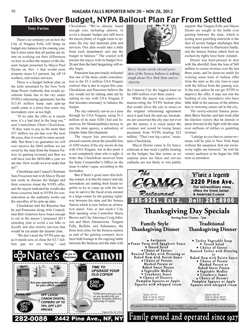Talks Over Budget, NYPA Bailout Plan Far From Settled
By Tony Farina
 |
There’s no certainty yet on how the City of Niagara Falls will bring its budget into balance in the coming year, but it does seem that all parties are intent on working out their differences on how to soften the impact of the disaster budget presented by Mayor Paul Dyster on Nov. 1 that would raise property taxes 8.3 percent, lay off 19 workers, and reduce services.
There is a budget bailout plan on the table presented by the New York State Power Authority that would accelerate funds due to the city under NYPA’s relicensing agreement, but the $13.45 million lump sum spin-up could come at a price that some city lawmakers view as too high.
“If we take the offer as it stands now, it’s a bad deal in the long run,” said Councilman Glenn Choolokian. “If they want to pay us the more than $37 million we are due over the next 44 years, then it would be more acceptable. But there’s no guarantee we will ever receive the $$60 million we are owed by the state from the Seneca Nation [in gaming revenue] and then we will have lost the $850,000 a year we are due. How would we ever make that up?”
Choolokian and Council Chairman Sam Fruscione met with Mayor Dyster last week to discuss the budget and their concerns about the NYPA offer, and the mayor indicated he would take those concerns back to NYPA for consideration as the authority works out the specifics of its spin-up plan.
Choolokian told the Reporter that he and Fruscione along with Councilman Bob Anderson have found enough to cut in the mayor’s proposed 2013 spending plan to avoid a tax hike or layoffs and also restore services that would be cut under the disaster plan.
“We don’t need the NYPA spin-up, as it stands now, to close the $3.7 million gap we are facing,” said Choolokian. “We’ve already found enough cuts, including salaries, to avoid a disaster budget and still leave the mayor plenty of wiggle room to operate the city and maintain jobs and services. Our plan would take a little from each department and put the budget in balance.” The council will present the mayor with its budget Nov. 28 and then the hard bargaining will really begin.
Fruscione has previously indicated that one of the items under consideration is the $3.1 million USA Niagara contract that is due to expire this year. Choolokian and Fruscione believe the city would not be risking state aid by cutting its ties with USA Niagara if that becomes necessary to balance the budget.
The city currently serves as a pass through for USA Niagara, using $3.1 million of its state AIM (Aid and Incentives for Municipalities) money to pay the state agency, a subsidiary of Empire State Development.
The mayor has previously expressed concern about the possible loss of AIM money if the city severs its ties with USA Niagara, but at this point it is not completely clear who is right. A letter that Choolokian received from the State Comptroller’s Office on the issue is rather vague, according to the lawmaker.
But if there’s good news this holiday season, it is that the mayor and city lawmakers are putting their heads together to try to come up with the best way to survive the fiscal crisis created to a large extent by the gaming rights’ war between the state and the Seneca Nation which is now before an arbitration panel. Also at last week’s City Hall meeting were Controller Maria Brown and City Attorneys Craig Johnson and Mort Abramowitz. Niagara Falls, Buffalo, and Salamanca, the three host cities for the Seneca casinos as part of the gaming compact, have been held hostage in the ongoing battle between the Senecas and the state with the Cataract City the biggest loser so far ($60 million over three years).
While the mayor was creative in maneuvering the NYPA bailout plan that would allow the city to return to the original relicensing agreement once it paid back the spin-up, lawmakers are concerned the city may not ever get the money it is owed under the compact and would be losing future payments from NYPA totaling $22 million. “That’s too big a price,” maintains Choolokian.
Mayor Dyster came in for heavy criticism at last week’s public hearing on the budget, but that comes as no surprise since tax hikes and service cutbacks are not likely to win public support. But Niagara Falls and Mayor Dyster are caught in the battle over gaming between the state, which is eyeing more gambling statewide in the face of severe budget challenges that were made worse by Hurricane Sandy, and the Seneca Nation which feels its exclusivity rights have been violated.
Dyster was hard-pressed to deal with the shortfall from the loss of $60 million in casino revenue over the last three years, and he deserves credit for winning some kind of bailout offer from the state as the city tries to cope with the fallout from the gaming war. In the end, unless he can get NYPA to improve the offer, it may not win the backing of city lawmakers who have little faith in the success of the arbitration in restoring casino aid to the city.
The newly-elected Seneca president, Barry Snyder, said last week after his election victory that he intends to press forward in the fight with the state over millions of dollars in gambling revenue.
“I pledge to you that no casino revenues will be paid to New York State without the assurance that our exclusivity rights are honored,” he told his victory audience as he began his fifth term as president.